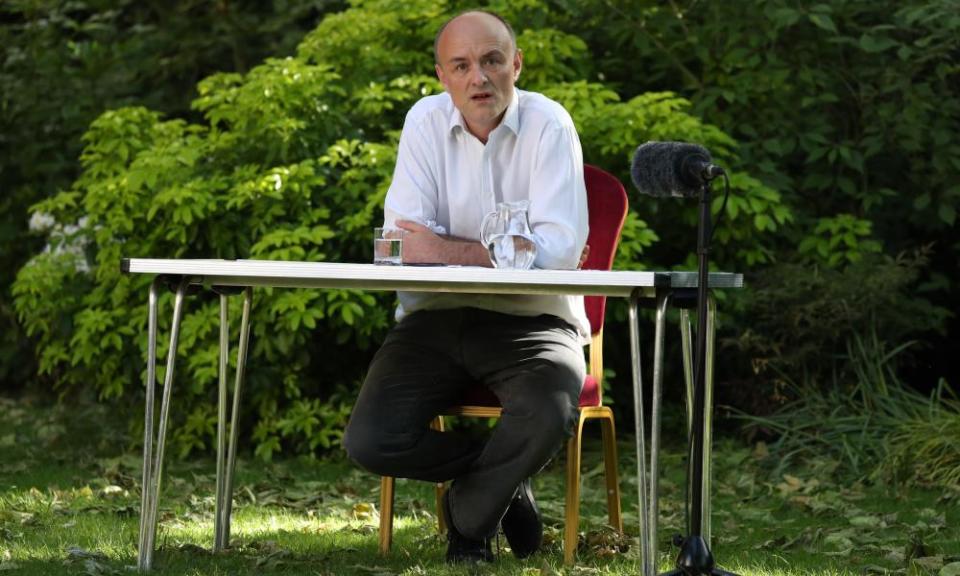Scottish Tory leader: I still can't see why Dominic Cummings did not resign

The Scottish Tory leader, Douglas Ross, has reignited the row over Dominic Cummings’ Durham lockdown trip by indicating that he could not see how the prime minister’s most senior aide did not resign over the incident.
Ross, who quit his junior ministerial post in protest at Cummings’ 264-mile journey from London at the height of Covid-19 restrictions, said the actions of Boris Johnson’s adviser were “indefensible” and that they had undermined the government.
In a fresh intervention unlikely to prove popular in Number 10, Ross stood by his decision to stand down and suggested Cummings should have followed his lead.
Pressed on whether he believed Cummings should have resigned over the affair, Ross told the Guardian: “If someone who was not involved at all resigned then, yes, I don’t see how the individual themselves couldn’t take that position. I was so far removed from the actions yet even that far away from it I felt what he did was indefensible and that’s why I would assume, or I feel, he would take the same decision but he didn’t.”
Ross was particularly unconvinced by Cummings’ excuse that he had gone on a separate drive with his family while he was in Durham to nearby Barnard Castle, apparently to test his eyesight. “I felt the only way I could be true to myself was to resign from government and to express my opposition to what he’d done, particularly the driving 60 miles to test your eyesight.”
Noting his wife’s job as a police officer, he said: “I did think, how would she manage if she pulled someone over for driving issues and they used the defence that they were testing their eyesight?” He has no regrets: “Several months on, I still believe it was the right decision to take.”

Rather than setting back the 37-year-old MP’s career, within months of his resignation in May from the role as parliamentary undersecretary of state for Scotland he was thrust back into the frontline of politics when he became the Conservatives’ leader north of the border uncontested. He has since set about reinvigorating the Scottish Conservatives’ approach as the SNP renews its calls for a second independence referendum. Nicola Sturgeon’s party is riding high in the polls ahead of next year’s Holyrood election.
Ross, who has a seat in Westminster but not in the Scottish parliament, appointed Ruth Davidson, who held his job until 2019, to be his party’s leader in Holyrood. Davidson has been no fan of Johnson and any apparent attempt by Ross to differentiate himself from No 10 could play well with the home crowd, given the prime minister’s popularity in Scotland is questionable.
In his conference speech this month, he called on his party to end the “defeatism and disinterest” over the country’s future in the UK, arguing that an SNP majority in next year’s Holyrood election was not inevitable.
Reflecting on the speech, Ross said he had wanted to “make it very clear that it’s in our name that we are both Conservative and unionists”. “I said in my speech it’s in our DNA and if you don’t believe in strengthening the union and the bonds that we share across four nations of the United Kingdom then you’ve got to reflect on if you’re in the right party or not,” he said.
“The feedback I’ve had back since is people at various levels in the party think it is right that that message was delivered just now because the defeatism and disinterest only benefits the SNP and their agenda to separate Scotland from the rest of the UK and I want to do everything I can to stop that.”
It comes as a poll this month put backing for independence at a record high of 58%. The SNP constitution secretary, Mike Russell, indicated on Thursday that Scotland could face a second independence referendum as early as next year, following the victory for the Better Together camp in 2014. Ross called Russell’s comments “deeply disappointing but sadly predictable”.
Reports also emerged this month about a leaked memo from a political consultancy firm given to senior Tories which said continuing to dismiss calls for another independence referendum could be counterproductive. It proposed potentially handing more power to Edinburgh. Ross said he did not receive the memo, but dismissed the suggestion of more powers going to Holyrood, suggesting the current ones should be used to better effect.
On Sturgeon’s handling of the pandemic, Ross highlighted her communication skills in what some might characterise as a subtle dig at Downing Street. “No one would doubt that Nicola Sturgeon is a highly effective communicator but when you look at the response to the pandemic in Scotland, and across the UK, it has been largely similar,” he said.
“So people who suggest there has somehow been a different approach to dealing with coronavirus in Scotland to the rest of the UK are simply unable to point to anything substantial that has been done differently. But there has been a difference in terms of the communication.”
Asked about Downing Street following Scotland in U-turning over the summer on exam results, Ross said: “From students receiving their exam results in Scotland, the U-turn took longer by the Scottish government than it did by the UK government. Now I think the UK government should have seen what happened in Scotland and changed the decision before exam results south of the border were even delivered … but the fact is that it took the Scottish government longer.”


